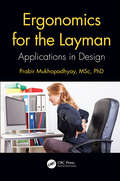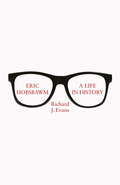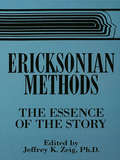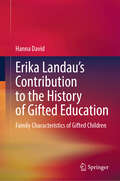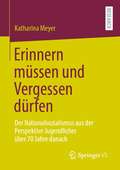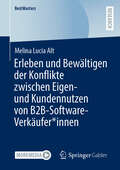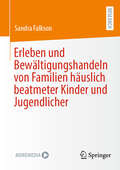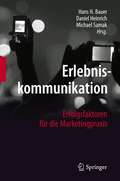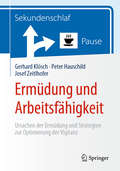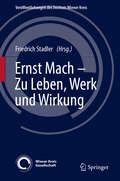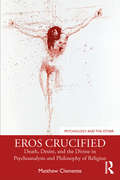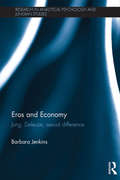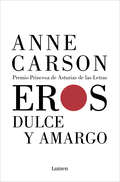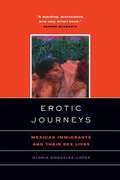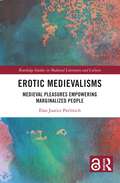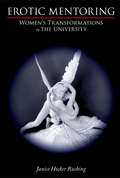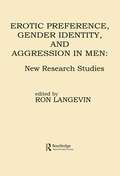- Table View
- List View
Ergonomics for the Layman: Applications in Design
by Prabir MukhopadhyayThis book explains the application of ergonomics in three different areas of design, namely product, space, and communication. The book is written in layman's language and provides examples so that the reader can easily apply the principles to their designs. This book is easy to understand for those without a background in science and technology. It provides a guide for designers from diverse fields ranging from product design to graphic design and shows how to apply ergonomic principles in products from hand-held products to larger products. It explains the application of anthropometric dimensions, as well as how to design for different spaces ranging from bathrooms to cinema halls. It also focuses on the application of communication ranging from displays to graphic design and discusses the significance of color selection. This book is ideal for all design students, practicing designers in any field, design faculty, entry-level engineering students, and anyone who is interested in exploring the field of ergonomics. Features Specifically written in such a way to make it easily understood for those not educated in the field Shows how to apply the ergonomic principles in design Provides an overview of the topic of ergonomics Written in a storytelling format
Ergotherapeutische Behandlungsansätze bei Demenz und Korsakow-Syndrom
by Gudrun Schaade Dorothee DankeAufbauend auf dem Lehrbuch „Ergotherapie bei Demenzerkrankungen" vertieft das Praxisbuch neue Behandlungs- und Betreuungsstrategien. Dabei baut die Autorin auf bekannte Therapiekonzepte für verhaltensgestörte Kinder (Sensorische Integration) und Schwerstbehinderte (Basale Stimulation) auf. Sie erläutert die Therapien für die unterschiedlichen Krankheitsphasen anhand von Handlungsempfehlungen und Fallbeispielen. Eine Einführung zu Aufbau und Funktionen des Gehirns bildet die Grundlage für die effektive Anwendung dieser Konzepte bei Demenzkranken.
Ergotherapie bei Demenzerkrankungen: Ein Förderprogramm
by Gudrun SchaadeDer Band stellt ein praxiserprobtes Förderkonzept für die Arbeit mit an Demenz erkrankten Patienten vor und liefert zugleich notwendiges Grundlagenwissen. Insbesondere wird aufgezeigt, wie gängige rehabilitative Behandlungsansätze mit anderen Methoden kombiniert werden können, die speziell auf die Möglichkeiten von Demenz-Patienten abgestimmt sind. Handlungsanleitungen und ein umfangreicher Fundus an Übungsvorschlägen liefern Anregungen für die praktische Umsetzung. Geeignet als Einstiegslektüre für einen anspruchsvollen Aufgabenbereich.
Ergotherapie in der akuten psychiatrischen Behandlungsphase bei Erwachsenen: 3-Phasen-Modell (essentials)
by Andreas LeschnikDie Ergotherapie in der akuten Krankheitsphase einer psychiatrischen Behandlung ist eine Herausforderung für den Patienten, da er sehr stark unter den Symptomen und der medikamentösen Einstellung leidet. Zudem kommt mit durchschnittlich 24,7 Tage im Krankenhaus eine kurze Verweilzeit hinzu. Welches ergotherapeutische Behandlungskonzept macht also Sinn? Dieses essential bietet mit seinem 3-Phasen-Modell ein Grundgerüst, wie man mit welchen Modellen Patientendaten erheben, Interventionen setzen und Evaluationen durchführen kann und zwar nach jeder Therapieeinheit, um festzustellen, welche Fortschritte der Patient macht und ob die Therapie neu angepasst werden muss.
Eric Hobsbawm: A Life in History
by Sir Richard J. Evans FBA, FRSL, FRHisAt the time of his death at the age of 95, Eric Hobsbawm (1917-2012) was the most famous historian in the world. His books were translated into more than fifty languages and he was as well known in Brazil and Italy as he was in Britain and the United States. His writings have had a huge and lasting effect on the practice of history. More than half a century after it appeared, his books remain a staple of university reading lists.He had an extraordinarily long life, with interests covering many countries and many cultures, ranging from poetry to jazz, literature to politics. He experienced life not only as a university teacher but also as a young Communist in the Weimar Republic, a radical student at Cambridge, a political activist, an army conscript, a Soho 'man about town', a Hampstead intellectual, a Cambridge don, an influential journalist, a world traveller, and finally a Grand Old Man of Letters.In A Life in History, Richard Evans tells the story of Hobsbawm as an academic, but also as witness to history itself, and of the twentieth century's major political and intellectual currents. Eric not only wrote and spoke about many of the great issues of his time, but participated in many of them too, from Communist resistance to Hitler to revolution in Cuba, where he acted as an interpreter for Che Guevara. He was a prominent part of the Jazz scene in Soho in the late 1950s and his writings played a pivotal role in the emergence of New Labour in the late 1980s and early 1990s.This, the first biography of Eric Hobsbawm, is far more than a study of a professional historian. It is a study of an era.
Erich Fromm: A Contemporary Introduction (Routledge Introductions to Contemporary Psychoanalysis)
by Sandra BuechlerIn this passionate volume, Sandra Buechler introduces Erich Fromm's groundbreaking contributions to psychoanalysis, sociology, philosophy, political action, and social criticism. | Buechler explores how Fromm's thinking and interdisciplinary vision are able to frame discussions of dilemmas in contemporary society. She offers a comprehensive biography of Fromm, before delving into his role as analyst, author, activist, sociologist and philosopher. From her own experience as a psychoanalyst, and from the testimony of Fromm's many ardent followers, Buechler illuminates Fromm's capacity to inspire. She considers how Fromm's writing equips students, beginning clinicians and more experienced professionals to understand what can give meaning to their efforts on behalf of troubled individuals, their riven communities, and the wider world. | Assuming no prior knowledge of Fromm's work, this books offers students in clinical and social psychology, sociology, and philosophy a vital insight into his theoretical contributions. It will also be of interest to psychoanalysts, psychologists and social workers.
Ericksonian Methods: The Essence Of The Story
by Jeffrey K. ZeigFirst published in 1994. Routledge is an imprint of Taylor & Francis, an informa company.
Erika Landau’s Contribution to the History of Gifted Education: Family Characteristics of Gifted Children
by Hanna DavidThis book describes some of the most critical issues in gifted education, i.e., gender inequity concerning giftedness examinations and the boys/girls ratio. The book also discusses the background of the gifted child's family, including their parents&’ education and number of their siblings. The book&’s findings are based on quantitative studies concerning 5–15-year-old gifted children participating at the Erika Landau Institute for Gifted and Creative Children and Youths in Tel Aviv, Israel, from 1968 until 2003. It discusses aspects such as the advantages of affirmative action standards in gifted education because girls who score lower than boys on the admission test to a gifted program usually have better social skills, persistence, and fine motor skills and, thus, integrate successfully in a gifted group with boys of higher intelligence. The book's second part addresses Landau's academic work in multiple languages and offers a critique that helps educators and mental health experts build gifted programs.
Erinnern müssen und Vergessen dürfen: Der Nationalsozialismus aus der Perspektive Jugendlicher über 70 Jahre danach
by Katharina MeyerMehr als 70 Jahre nach dem Ende des Nationalsozialismus prägt die wachsende zeitliche Distanz zum historischen Geschehen die Auseinandersetzung mit diesem. Veränderte familiäre Bezüge, der Abschied von Zeitzeug*innen und gegenwärtige gesellschaftliche Diskurse nehmen Einfluss auf die Perspektiven Jugendlicher. Dies wirft eine Vielzahl von Fragen auf: Wie beschäftigen sich junge Menschen in Deutschland mehr als sieben Jahrzehnte nach dem Holocaust mit dem Thema? Welche Relevanz hat der Nationalsozialismus für sie, welche geschichtlichen Vorstellungen von der Zeit haben sie und wie erleben sie den Umgang damit in Deutschland? Die Studie geht diesen Fragen anhand des Gruppendiskussionsverfahrens und der Grounded Theory Methodologie empirisch nach, nimmt Kontinuitäten und Brüche in den Bezügen zum Nationalsozialismus in den Blick und zeigt Zusammenhänge zur Identifikation mit Deutschland auf.
Erleben und Bewältigen der Konflikte zwischen Eigen- und Kundennutzen von B2B-Software-Verkäufer*innen (BestMasters)
by Melina Lucia AltVerkäufer*innen in der B2B-Softwarebranche stehen im digitalen Zeitalter mehr denn je vor der Herausforderung, die Bedürfnisse ihrer Kund*innen und ihre eigenen Interessen abzuwägen. Dieses Buch beschäftigt sich mit der Frage, wie Verkäufer*innen diesen Konflikt erleben und wie sie ihn bewältigen. Außerdem wird der Einfluss ihrer Führungskräfte betrachtet. Mit den Methoden der reflexiven Grounded Theory wird die deutsche Softwareindustrie betrachtet und aus der Praxis ein realitätsnahes Modell abgeleitet. Dabei zeigt sich, dass vielfältige Faktoren Vertriebskonflikte und persönliche Belastungen beeinflussen und dass insbesondere die Abhängigkeit zwischen Vertriebspartnern und Softwareherstellern ein bislang vernachlässigtes Forschungsfeld ist. Dieses Buch liefert Erkenntnisse für die Berufspraxis von Personaler*innen, Entscheider*innen und Führungskräften in der Softwarebranche.
Erleben und Bewältigungshandeln von Familien häuslich beatmeter Kinder und Jugendlicher
by Sandra FalksonSandra Falkson widmet sich in ihrer Studie der Frage, wie Familien den Alltag mit einem langzeitbeatmeten Kind erleben, welche Herausforderungen sie bewältigen und welche Strategien sie dafür entwickeln. Auf Basis der Grounded Theory wurden Interviews mit 21 Familien geführt. Die Ergebnisse zeigen, dass die Familien große Anpassungsleistungen erbringen, um ein Gleichgewicht zwischen intensivmedizinischer Versorgung und normalem Familienleben zu wahren. Die Autorin betont die Bedeutung nachhaltiger Versorgungskonzepte, die nicht nur das beatmete Kind, sondern die gesamte Familie unterstützen und entlasten.
Erlebniskommunikation
by Daniel Heinrich Hans H. Bauer Michael SamakWer auf umkämpften Märkten das Interesse der Konsumenten wecken will, muss Botschaften emotional gestalten und auf neuen Wegen kommunizieren. Diese Erlebniskommunikation ist allgegenwärtig geworden. In dem Buch stellen Experten praxisrelevante und wissenschaftlich fundierte Erkenntnisse zu den Erfolgsfaktoren einer effizienten Erlebniskommunikation vor. Neben der Perspektive eines erlebnisorientierten Markenmanagements vermitteln sie auch die Handhabung der Steuerungsinstrumente. Best-Practice-Beispiele geben Einblick in erfolgreiche Kampagnen.
Erlebniskommunikation: Erfolgsfaktoren für die Marketingpraxis
by Daniel Heinrich Hans H. Bauer Michael SamakWer auf umkämpften Märkten das Interesse der Konsumenten wecken will, muss Botschaften emotional gestalten und auf neuen Wegen kommunizieren. Diese Erlebniskommunikation ist allgegenwärtig geworden. In dem Buch stellen Experten praxisrelevante und wissenschaftlich fundierte Erkenntnisse zu den Erfolgsfaktoren einer effizienten Erlebniskommunikation vor. Neben der Perspektive eines erlebnisorientierten Markenmanagements vermitteln sie auch die Handhabung der Steuerungsinstrumente. Best-Practice-Beispiele geben Einblick in erfolgreiche Kampagnen.
Ermüdung und Arbeitsfähigkeit: Ursachen der Ermüdung und Strategien zur Optimierung der Vigilanz
by Gerhard Klösch Peter Hauschild Josef ZeitlhoferDieses Buch über Wachheit / Vigilanz richtet sich an Ärzte, Psychologen, Gesundheitsmanager und Sicherheitsfachkräfte und versteht sich als Einführung in das Gebiet der Vigilanzforschung. Aktiv, fit und leistungsfähig zu sein sind Attribute, die hoch im Kurs stehen. Die Schattenseite: Erschöpfung, Müdigkeit und Ausgebranntsein nehmen rasant zu. Einer der Gründe: chronischer Schlafmangel. Doch Müdigkeit hat viele Facetten und Ursachen. Dieses Buch, von Experten auf dem Gebiet der Schlafmedizin und Chronobiologie geschrieben, zeigt die physiologischen und psychologischen Hintergründe von Ermüdungsprozessen und informiert, wie Vigilanz und Müdigkeit gemessen werden können, welche Strategien helfen, um wach zu bleiben, und wie Übermüdungssituationen am Arbeitsplatz evaluiert werden können. Aus dem Inhalt: Vigilanz, Müdigkeit, Schläfrigkeit, Fatigue: Versuch einer Begriffsbestimmung – Das Konstrukt Vigilanz - Anatomie und Physiologie der Wachheit – Der feine Unterschied: Belastung oder Beanspruchung – Messverfahren zu Vigilanz und Ermüdung – Strategien zur Optimierung der Vigilanz – Fatigue Risk Management - Vermeidung und Prävention müdigkeitsbedingter Unfälle. Die Autoren: Gerhard Klösch, MPH ist Schlafforscher und stellvertretender wissenschaftlicher Leiter des Zertifikatskurses Schlafcoaching an der Medizinischen Universität, Wien. Dr. Peter Hauschild und Prof. Josef Zeitlhofer leiten das Institut für Chronopsychologie und Chronomedizin an der Sigmund Freud PrivatUniversität, Wien.
Ernst Mach – Zu Leben, Werk und Wirkung (Veröffentlichungen des Instituts Wiener Kreis #29)
by Friedrich StadlerErnst Mach (1838–1916) zählt zu den bedeutendsten Naturwissenschaftlern und Philosophen des 19. und 20. Jahrhunderts. In der Physik gilt er als Wegbereiter von Einsteins Relativitätstheorie und Kontrahent von Boltzmanns Atomistik. In der Biologie, Psychologie und Physiologie wird er als Pionier einer empiristischen und gestalthaften „Analyse der Empfindungen“ betrachtet. In der Wissenschaftsphilosophie schließlich war er Vorbild des Wiener Kreises mit dem Verein Ernst Mach und Wegbereiter einer integrierten Wissenschaftsgeschichte und Wissenschaftstheorie.Der Band versammelt die deutschsprachigen Beiträge zum Symposium anlässlich des 100. Todestages von Ernst Mach. Im Mittelpunkt der internationalen Konferenz im Juni 2016 an der Universität Wien und der Österreichischen Akademie der Wissenschaften standen Leben, Werk und Wirkung des Naturforschers und Philosophen. Der Band bietet eine kritische Bestandsaufnahme von Machs Lebenswerk vor dem Hintergrund der aktuellen Forschung und Historiografie.Die Autoren untersuchen unter anderem• seine Bedeutung für die Herausbildung einer naturwissenschaftlichen Psychologie• Machs historisch-kritische Methode• die Rolle der Kinematographie• die Rezeption durch Aleksander Bogdanov• das Verhältnis zu Sigmund Freuds Psychoanalyse Der Band erscheint in der Reihe „Veröffentlichungen des Instituts Wiener Kreis“ und richtet sich an Forschende auf den Gebieten der Wissenschaftsphilosophie, -geschichte und -theorie sowie der Kulturwissenschaften und der Wahrnehmungspsychologie.
Ernstige psychiatrische aandoeningen
by Ad Kaasenbrood Lex WunderinkAls mensen langere tijd (meerdere jaren) lijden aan een psychiatrische stoornis en daardoor ook in de problemen komen met bijvoorbeeld hun relaties, werk, financiën of woonplek, dan kun je spreken van een ernstige psychiatrische aandoening (EPA). Niet zelden zijn tegelijkertijd verschillende stoornissen aanwezig waardoor de aandoening én de behandeling ervan complex is. Mensen met een ernstige psychiatrische aandoening kunnen met verschillende soorten stoornissen kampen.Naar schatting hebben ruim 280.000 mensen in Nederland (1,7% van de totale bevolking) een ernstige psychische aandoening. Deze groep is door de aard van de problematiek lastig te behandelen. Doel van dit boek is om handvatten aan behandelaren te geven in de omgang met EPA-patiënten, richting te geven voor de behandeling en te inspireren.
Eros Crucified: Death, Desire, and the Divine in Psychoanalysis and Philosophy of Religion (Psychology and the Other)
by Matthew ClementeBringing contemporary philosophers, theologians, and psychoanalysts into dialogue with works of art and literature, this work provides a fresh perspective on how humans can make sense of suffering and finitude and how our existence as sexual beings shapes our relations to one another and the divine. It attempts to establish a connection between carnal, bodily love and humanity’s relation to the divine. Relying on the works of philosophers such as Manoussakis, Kearney, and Marion and psychoanalysts such as Freud and Lacan, this book provides a possible answer to these fundamental questions and fosters further dialogue between thinkers and scholars of these different fields. The author analyzes why human sexuality implies both perversion and perfection and why it brings together humanity’s baseness and beatitude. Through it, the author taps once more into the dark mystery of Eros and Thanatos who, to paraphrase Dostoevsky, forever struggle with God on the battlefield of the human heart. This book is written primarily for scholars interested in the fields of philosophical psychology, existential philosophy, and philosophy of religion
Eros and Economy: Jung, Deleuze, Sexual Difference (Research in Analytical Psychology and Jungian Studies)
by Barbara JenkinsEros and Economy: Jung, Deleuze, Sexual Difference explores the possibility that social relations between things, partially inscribed in their aesthetics, offer important insights into collective political-economic relations of domination and desire. Drawing on the analytical psychology of Carl Jung and the philosophy of Gilles Deleuze, this book focuses on the idea that desire or libido, overlaid by sexual difference, is a driving force behind the material manifestations of cultural production in practices as diverse as art or economy. Re-reading the history of capitalism and aesthetics with an awareness of the forces of sexual difference reveals not just their integral role in the development of capitalist markets, but a new understanding of our political-economic relations as humans. The appearance of the energies of sexual difference is highlighted in a number of different historical periods and political economies, from the Rococo period of pre-revolutionary France, to the aesthetics and economics of Keynesian Bloomsbury, to our contemporary Postmodern sensibility. With these examples, Jenkins demonstrates that the very constitution of capitalist markets is affected by the interaction of these forces; and she argues that a conscious appreciation and negotiation of them is integral to an immanent, democratic understanding of power. With its unique application of Jungian theory, this book provides important new insights into debates surrounding art, aesthetics, and identity politics, as well as into the quest for autonomous, democratic institutions of politics and economics. As such, this book will appeal to researchers, academics and postgraduate students in the fields of Jung, psychoanalysis, political economy, cultural studies and gender studies, as well as those interested in the field of cultural economy.
Eros dulce y amargo
by Anne CarsonLa gran meditación sobre el amor, el deseo y los celos, de la autora de La belleza del marido, Premio Princesa de Asturias de las Letras 2020 «Leería cualquier cosa que Anne Carson escribiera.»Susan Sontag«Una escritora deslumbrante.»Harold Bloom«Brillante y llena de ingenio, apasionada y profundamente conmovedora.»Michael Ondaatje ¿Cómo nos enamoramos? ¿Cómo surge el deseo erótico? ¿Por qué amor y odio convergen en él? Con la gracia y la brillantez que definen su poesía, Anne Carson desentraña los orígenes del deseo y sus contradicciones explorando la figura de Eros desde Safo de Lesbos -quien lo describió como «dulce y amargo»- o Platón, hasta Madame Bovary, Ana Karenina o nuestra Regenta. Helenista de formación, la escritora canadiensenos lleva hasta el origende nuestra cultura y de nuestra condición humana para iluminar problemas de nuestro tiempo en un gran ensayo, idóneo para iniciarse en su obra o para reencontrarse con ella. La crítica ha dicho...«Con un estilo profundo pero a la vez atractivo y dotado de amenidad, Carson parte de las palabras de la poeta Safo para rastrear los orígenes y el sentido del deseo. [...] Merece la pena entrar en el universo que plantea Carson, siempre impregnado de poesía, un mundo tan particular como poderoso.»Telva «Hay que leerla para rastrear el enigma de la belleza y el sexo. [...] Carson se reconoce en la esencia de la Antigua Grecia y la condensa en la luz de las cocinas y sus desayunos, en la nieve y en el bosque, en las conversaciones dolorosas, en las despedidas extrañas, en las páginas de los libros que enumera o en las citas de los versos que le ayudan a fabricar la textura inquietante de su propio universo.»Ana Merino, El Mundo «Letraherida por la literatura griega, Anne Carson ha dedicado su vida a indagar en los clásicos, a quienes nos acerca con singular talento: [...] Carson tiene el poder de hacer coincidir a Helena de Troya o Hércules con iconos occidentales como Marilyn Monroe. La llegada a las librerías de Eros dulce y amargo es una celebración. Y es que en esto del amor y el deseo, seguimos en manos de Afrodita.»Harper's Bazaar «Ha alcanzado unas cotas de intensidad y solvencia intelectual que la sitúan entre los escritores más destacados del presente. Desde el estudio grecolatino ha construido una poética innovadora donde la vitalidad del gran pensamiento clásico funciona a la manera de un mapa que invita a dilucidar las complejidades del momento actual. Su obra mantiene un compromiso con la emoción y el pensamiento, con el estudio de la tradición y la presencia renovada de las Humanidades como una manera de alcanzar mejor conciencia de nuestro tiempo.»Jurado del Premio Princesa de Asturias de las Letras «Un premio merecidísimo para una futura Nobel.»César Antonio Molina, ABC «Carson tiene un estilo por el que cualquier poeta sería capaz de matar.»The New York Times Book Review «La voz más respetada hoy de las letras anglosajonas, una de las grandes.»Elena Hevia, El Periódico «Una de las escritoras más exquisitas, radicales y eruditas de la literatura actual, dueña de una obra poliédrica, [...] hipnótica.»Miguel Lorenci, EFE «La poeta que habla con los dioses.»Luis Alemany, El Mundo «Un asombroso hojaldre de sentimientos encontrados, de reflexiones a menudo contradictorias sobre la belleza [...], sobre el amor, sobre la sinceridad, sobre el deseo.»Ignacio Echevarría, El Cultural de El Mundo (sobre La belleza del marido)
Eros: Beyond the Death Drive
by Rosaura Martínez RuizEros considers a promise left unfulfilled in Sigmund Freud’s Beyond the Pleasure Principle. Rosaura Martínez Ruiz argues that when the pleasure principle comes into contact with the death drive (the human tendency toward aggression or cruelty), the psyche can take detours that, without going beyond the limit of the pleasure principle, can nevertheless defer it. Eros reflects on these deviations of the pleasure principle, in the political sphere and in the intimate realm. Following these erotic paths, Martínez argues that the forces of the death drive can only be resisted if resistance is understood as an ongoing process. In such an effort, erotic action and the construction of pathways for sublimation are never-ending ethical and political tasks. We know that these tasks cannot be finally accomplished, yet they remain imperative and undeniably urgent.If psychoanalysis and deconstruction teach us that the death drive is insurmountable, through aesthetic creation and political action we can nevertheless delay, defer, and postpone it. Calling for the formation and maintenance of a “community of mourning duelists,” this book seeks to imagine and affirm the kind of “erotic battalion” that might yet be mobilized against injustice. This battalion’s mourning, Martínez argues, must be ongoing, open-ended, combative, and tenaciously committed to the complexity of ethical and political life.
Erotic Journeys: Mexican Immigrants and Their Sex Lives
by Gloria Gonzalez-LopezThis is a vivid chronicle of the sex lives of male and female Mexican immigrants in the US that highlights how ideas about sex change after migration to this country.
Erotic Massage for Couples: Head to Toe Techniques to Arouse and Gratify Your Partner
by Sylvia PattersonThis comprehensive manual is an invitation to discover the secrets of erotic massage for couples.Erotic Massage for Couples teaches you, step-by-step--with the help of one hundred color photos--how to unleash your new sensual experiences onto your partner. This comprehensive, practical book includes:* A guide to the points of greatest pleasure* Advanced techniques for couples* Homemade recipes for massage oils* Aromatherapy to awaken the five senses* Bedroom feng shui* Tricks to convert your bathroom to a spa* Aphrodisiac dishes and beverages* Automassage techniques* And much more!
Erotic Medievalisms: Medieval Pleasures Empowering Marginalized People
by Elan Justice PavlinichErotic Medievalisms exposes modern apparatuses of oppression, reclaims histories for marginalized people, and promotes more inclusive representations in popular culture. Modern representations of the Middle Ages—including Santiago García and David Rubín’s graphic novel, Beowulf; Lil Nas X’s music video for "Montero (Call Me by Your Name);" Patience Agbabi’s retelling of Chaucer’s The Miller’s Tale, entitled "The Kiss;" and some BDSM (bondage and discipline, dominance and submission, sadism and masochism) practices—challenge pervasive power structures that privilege heterosexual male dominance commonly associated with medieval origins in popular culture. This comparative study between medieval and modern texts foregrounds the sexual gratification of people who are typically excluded from representations of the Middle Ages, specifically women, people of color, and LGBTQ+ individuals. Erotic displays of marginalized people in medieval contexts disrupt prevalent forms of oppression rooted in institutions that censor human experiences and direct sexual desires toward social justice.
Erotic Mentoring: Women's Transformations in the University (Writing Lives: Ethnographic Narratives)
by Janice Hocker RushingThey’re everywhere in the academy: young, bright women mentored by older scholars, usually men, who attempt to mold them into their own masculine ideals. Janice Hocker Rushing’s study of over 200 women and their life transformations is the subject of this eloquent book. Using the tropes of mythology and Jungian psychology, the author characterizes the many paths these women’s academic lives take: as Muse for a faltering older scholar, as Mistress or wife, as the dutiful academic daughter. Their resistance to this power differential also takes many forms: as a Veiled Woman, silent in public but active in private, or the Siren, using her sexuality to beat the system. Ultimately, Rushing arrives at the myth of Eros and Psyche, where women’s self understanding and personal development turns her erotic mentoring into an autonomous, whole, and free life, unfettered by any man. These women’s stories and Rushing’s literary and literate framing of their lives will ring true to many in the university.
Erotic Preference, Gender Identity, and Aggression in Men: New Research Studies
by Ron LangevinA fresh and challenging re-evaluation of the interrelationship between sexual and gender behavior and aggression. Drawing on a series of previously unpublished controlled research studies on rapists, pedophiles, incest offenders, voyeurs, transsexuals, and homosexuals (among others), the book offers startling new findings- e.g., crossdressing and feminine gender identity in rapists believed to be ultra-masculine, aggressiveness in pedophiles believed to be shy and passive. This book brings a new perspective to understanding sexual anomalies and to the conceptual foundations on which clinical research and treatment of these behaviors rests.
